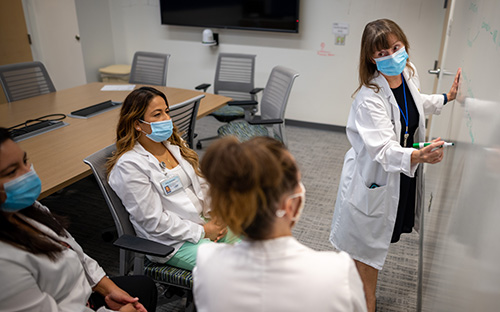Preparing family nurse practitioners as change agents
The future of health care is undefined. Health care needs professionals who seek a greater impact — people who believe there is a better way. With people over 60 years old forecasted to make up a quarter of California’s population by 2030, there is a growing need for primary care providers who understand the unique needs of an aging population and who can promote health across the lifespan.
Family nurse practitioners (FNPs) are uniquely positioned to ignite bold change in health care. The nurse practitioner profession is No. 3 in the U.S. News & World Report Top 100 Best Jobs and No. 2 in its Top 100 Best Health Care Jobs. The Betty Irene Moore School of Nursing at UC Davis Master of Science — Family Nurse Practitioner Degree Program, as well as the Doctor of Nursing Practice — Family Nurse Practitioner Degree Program currently under development, focus on the preparation of new FNPs for this ever-changing environment.
According to the American Association of Nurse Practitioners (AANP), more than 50 years of research demonstrates that nurse practitioners (N.P.s) provide high-quality primary, acute and specialty health care services across the life span and in diverse settings.
“Research has found that patients under the care of nurse practitioners have fewer unnecessary hospital readmissions, fewer potentially preventable hospitalizations, higher patient satisfaction and fewer unnecessary emergency room visits than patients under the care of physicians,” AANP reported.

Family nurse practitioner program director Kathryn Sexson, right, says faculty work closely with students to mentor them as future providers in the community.
“UC Davis seeks students who are committed to improving the health of populations, eliminating health inequities and advancing systems to allow us to partner effectively with patients, families and communities. We also want professionals who value the relationships built over time through the development of strong collaborations with patients and other professionals,” said Kathryn Sexson, director of the school’s FNP programs.
With its specialty focus on geriatrics, family medicine, underserved communities and rural health, our FNP programs infuse leadership, create interprofessional experiences and offer student support so graduates excel in school and their future careers.
Graduates of the FNP programs possess the skills, confidence and vision to be agents of change on many levels. They gain critical thinking, clinical excellence and deep understanding of health care systems that prepare them to flourish in practice. They are prepared as leaders to advance health locally, national and globally in ways that address the inequities, big and small, that stand in the way of optimal health and health care equity for all.
“The person who values clinical excellence and fosters community by recognizing the value each of our colleagues brings to the table — whether it is a fellow FNP student, a faculty member, a member of the interprofessional team or a community member — is someone who will excel in our program,” Sexson said. “It is not about who is at the top of the class here, but how together we all succeed.”
The school’s FNP programs offer unique learning opportunities to students here on the UC Davis Sacramento campus, which includes the Betty Irene Moore School of Nursing, the UC Davis School of Medicine and UC Davis Medical Center. This academic health center is a hub of innovation where students, trainees, faculty and staff from nearly 100-post graduate majors bring unique and creative approaches to health care.
“We offer an in-depth exploration of health equity and the factors that contribute to health disparities using a systems-based approach to examine not only the health care system, but also the multiple contributing factors including historical context, institutionalized racism, geographic influences and economic factors,” Sexson said.
Finally, the FNP programs are committed to interprofessional educational experiences across multiple disciplines including medicine, social work, veterinary medicine and nursing to provide FNPs with an understanding of roles, collaborations and opportunities for leadership.
Sexson said the School of Nursing’s diverse faculty team is committed to educating the next generation of providers who are not afraid to question the status quo.
“We recognize that students face many challenges not only academically, but in their lives outside of school. Faculty mentor students into the professional role and support them to be the family nurse practitioner they strive to become,” she said.
That support comes in a variety of student success initiatives, including student wellness programs, group and individual office hours, peer-led study groups, as well as guidance from both advisors and mentors.
“Students can expect faculty who are as just as invested in your success as you are. You can expect them to develop and maintain a rigorous program that prepares you clinically and also prepares you to address quality improvements through leadership and innovation,” Sexson said. “Our faculty value your input and are committed to a collaborative learning environment.”





